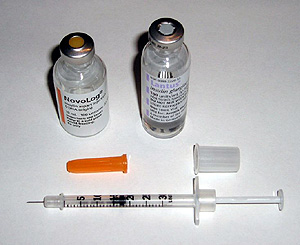 Quite a title huh? But some new research in JAMA suggests that it is true. At least these 14 patients haven't had to inject insulin for 1-35 months (so far).
Quite a title huh? But some new research in JAMA suggests that it is true. At least these 14 patients haven't had to inject insulin for 1-35 months (so far).
These folks were all on their way to having Type 1 diabetes. As you probably know, Type 1 diabetes happens when a patient’s immune system destroys beta cells in their pancreas. (Type 2 diabetes works differently.) These beta cells make insulin.
Without insulin, glucose builds up in our blood and causes all kinds of problems. This is why people with Type 1 diabetes need to take insulin. To get sugar out of the blood and into the cells.
So what some U.S. and Brazilian researchers did was destroy 14 diabetics' immune systems so they couldn’t attack their own beta cells anymore. Then they rebuilt their immune systems using the patients' own blood stem cells harvested from their blood. And voila, 14 patients no longer need insulin injections.
This worked because researchers identified patients who were just starting to get diabetes. These folks still have a good chunk of their beta cells left. Enough to make their own insulin if their immune system would just back off.
